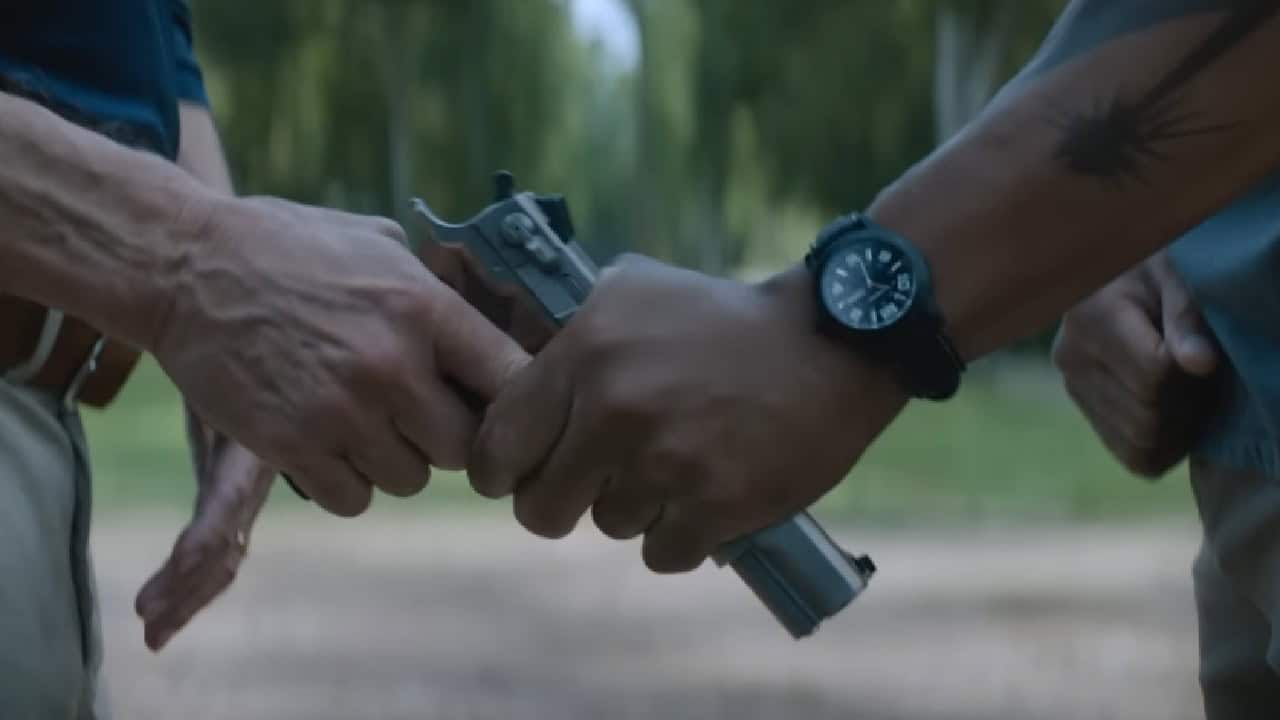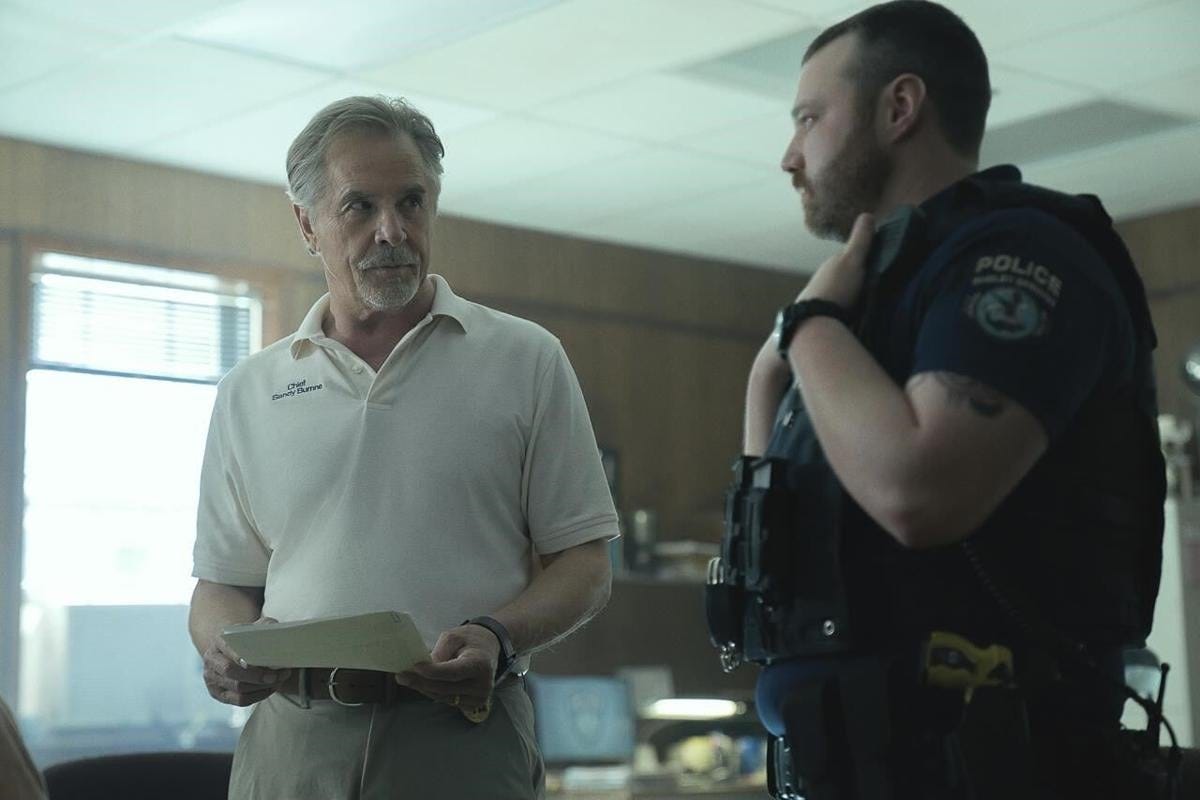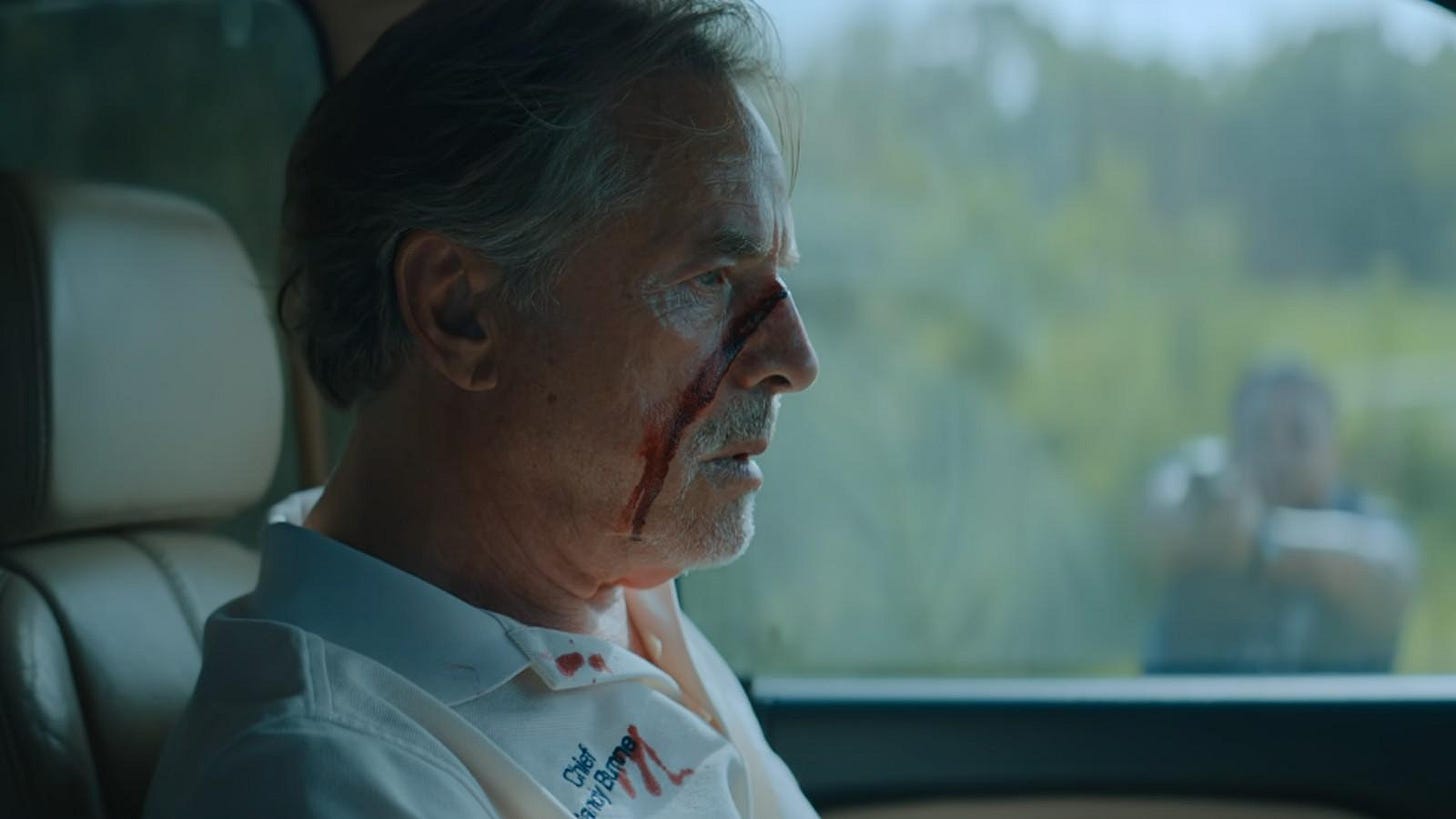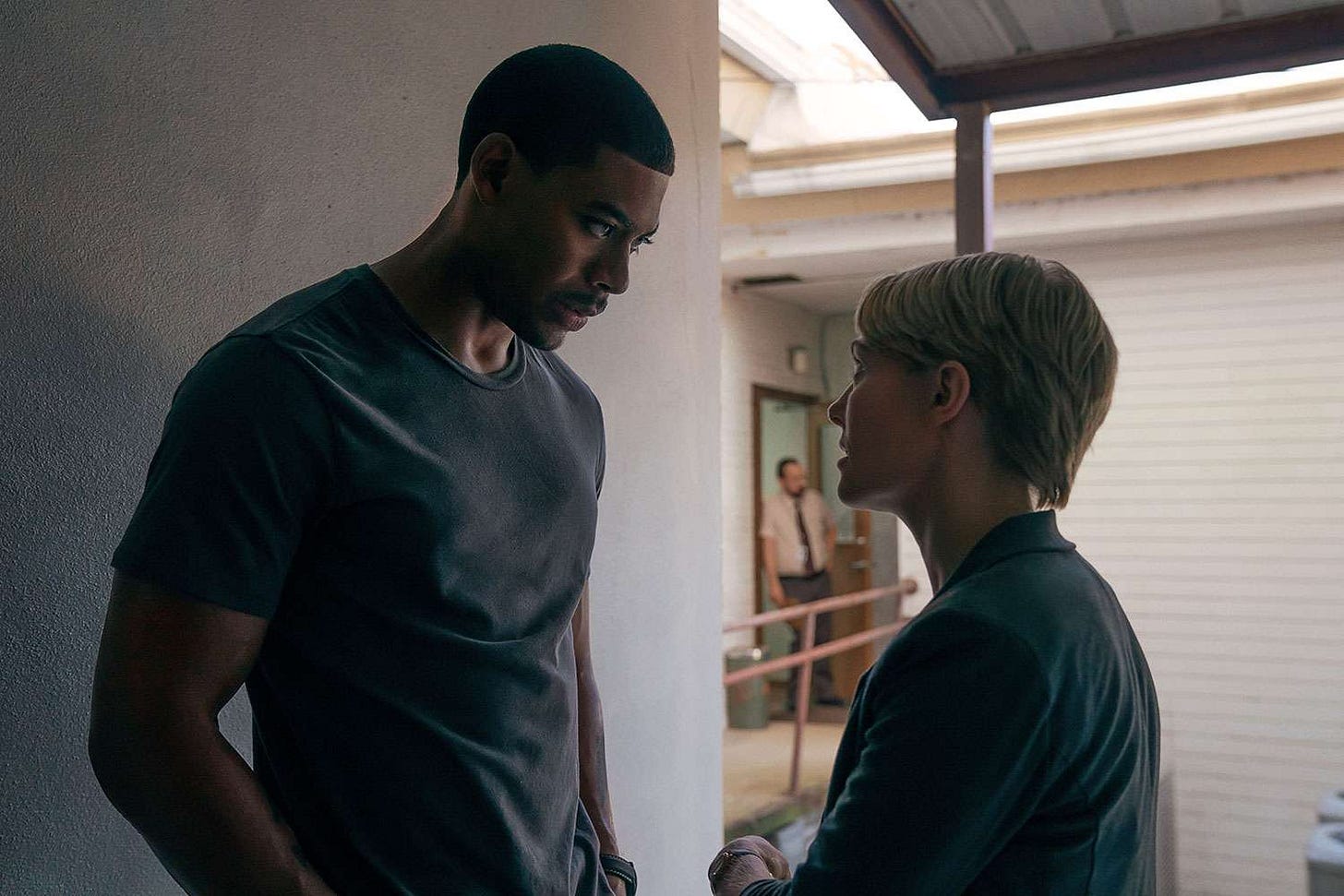A young man pedals his bike to the sounds of heavy metal music. A cop car emerges from behind, though the road is wide. The shadow of the road then shrinks, quickly, and before the viewer can get his bearings, the bicyclist is lying flat on the street. The car, which clipped him, comes to a stop. Clop clop clop, and out come the radios, and the weapons. The victim is splayed out, but breathing, conscious.
They threaten him. They taunt him. Gradually, the viewer realizes the police officers are white, and the cyclist is Black. What you choose to do with that information is up to you. The item of interest is a knapsack across his back, now on the floor. The cops try to cajole the young man into opening the bag. He denies, because he understands the laws and their limitations. These men try another way. Further threats ensue. Finally, with the young man restrained (not arrested, but “detained”), it is explained to him that the bag’s contents, several thousand dollars, are now property of the police. He is not charged with a crime, he is not accused of a crime. But, as “Rebel Ridge” stands to emphasize to the viewer, the officers haven’t broken the law either. They have robbed a man, and they are protected by law.
Jeremy Sauliner’s “Rebel Ridge” is a sizzling new Netflix thriller that features your usual suspense-thriller elements, though in a confident, thoughtful way not seen since the more mature action films of yesterday starring the likes of Charles Bronson and maybe Sidney Poitier. But it’s important to note how it depicts the power of law enforcement officials. Because the opening scene illustrates a case of civil asset forfeiture, and it happens all the time.
Regular Americans generally know the vague outline of the rules of criminal justice — innocent until proven guilty, Miranda Rights, etc. But all of that has to do with being arrested and/or charged for a crime. Which implies that officers spend all day driving around, arresting people, far from the truth in most cities and towns. The standards for arrest are high in most cases. But people have to understand that the standards are low for nearly every other action the police might take, including drawing a weapon, physical altercations, and seizure of property. Civil asset forfeiture doesn’t have to derive from an arrest or a conviction, but merely the suspicion of one.
If you challenge such a case, as Aaron Pierre’s Terry initially wishes to do (sidenote: Pierre is brilliant in this), then the police department’s case may fall apart, and it may turn out the evidence leading to the seizing of material was inadequate. But now you’re going to court against not one man, or a few guys, but an entire apparatus. It ain’t their first rodeo. And do you have it in you to retain a lawyer through a sea of postponements, cancellations and frivolous motions that delay your case forever? Terry, who needs that cash quickly, now won’t see it for at least a year as he fights the police in court for material they stole from him. And the money taken from him will now be spent on lawyers and court dates. The motivation to engage in civil asset forfeiture is considerable for officers and departments, because there’s a chance there will be zero legal consequence.
Translation: the law protects law enforcement officials when they want to take from you.
“Rebel Ridge” isn’t necessarily didactic about the topic, but it’s worth noting this is a film about the less-sensationalist aftermath of the 2020 nationwide protests. When I think of police reform that was passed in that era, I also think of the First Step Act, the significant federal prison reform that shaved months off the end of my sentence. The First Step Act promised several immediate reforms. But it also promised long-term benefits for inmates, including job training, more sufficient “programming”, and a reevaluation of those eligible for home confinement and compassionate release. But institution to institution, it seemed clear that none of these places had figured out exactly how to integrate these changes, or which funds to access. Then COVID hit, and most of these adjustments weren’t implemented until several years later, if at all.
Similarly, as one character in “Rebel Ridge” explains it, officials in Alabama placed several sanctions and reforms on local police departments in the wake of social unrest. But they didn’t follow through, as the departments themselves were forced to conjure up the money on their own to implement these costly fixes. Because this was an operation lacking a watchman, it’s not a surprise that, if funding existed, it disappeared into less-savory outlets. In “Rebel Ridge”, the answer is ambiguous, but troubling: either Terry’s bag of money (meant to bail out his brother) is going to fund the tiny department for a couple of quarters of the year, or it’s just more excess cash to steal. To me, it’s a classic case of officials splurging on themselves and placing the blame elsewhere. It seemed like every time I interacted negatively with prison officials, it was in a way that ensured whatever ensued could be blamed on someone other than them. I suppose it could be read either way, as director Jeremy Sauliner and his collaborators are not as strident in their beliefs as I am. That’s a compliment. I am a cynic in these regards.
Terry, to his credit, keeps a cooler head than I would. He has no criminal past, and is instead an ex-Marine just trying to compromise and help his incarcerated brother. Terry has some cheek, but he’s largely trying to behave appropriately in re-acquiring the stolen money. He tries to file a police report at the same precinct where the officers in question work. He is respectful and straight with everyone. And when he is denied, and when contingency plans fall through, he comes up with a decent compromise, one that jeopardizes him and benefits the officers but leaves him in the red. But there is no compromise. This is pure law enforcement entitlement.
I could relate to the fact that there’s more at stake for Terry than a considerable sum of money and his dignity. The bail money is to spring his brother, who is otherwise about to be transferred to a local state facility. To the officers, it’s just moving an inmate from A-to-B like furniture. But Terry’s brother previously ratted on others in exchange for his freedom a short while back. Now that he’s re-offended (allegedly), he’ll be placed in a situation where everyone knows he’s a snitch. He’s not just trying to keep his brother out of state prison. He’s trying to keep his brother from getting murdered. More than once, I have heard and seen officials, with no regard for an inmate’s status, place him in general population despite a high threat level. Those who rat have to understand that any relief they gain from such a practice will be temporary. They care little about how you might be saving your own life. They just want the information. Once they have that information, once they have all those additional prosecutions under their belt, the snitch is forgotten. To Terry, he’s saving his brother’s life. To the cops, he’s just another convict. Just another piece of furniture.
What stands out about “Rebel Ridge” is that the first fifteen minutes or so would be an excellent short film about the lack of consequences for law enforcement. It isn’t a situation like with Derek Chauvin or the murder of Ahmaud Arbery — if what happened to Terry occurred in the real world, the earth would continue to spin. This is sanctioned theft and abuse of the people. And of course, the officials have the win in their hand without any illegal activity, and they stay firmly in the W column for a long portion of the film. The story escalates, and becomes more of a movie (a propulsive, exciting one), because they decide to cheat and run up the score. What’s important to learn is that they didn’t have to. All across the nation, they never have to.
The lingering feeling from “Rebel Ridge” is to answer the zealots on all sides in the wake of calls for police and criminal justice reform in recent years. No, the police departments didn’t reform. The reformers wanted to get their photo opportunity, but many police stations were left underpopulated, underfunded. An amusing visual is that the Shelby Springs police department is so small it shares the property with local tailgaters who spend the day drinking and waiting for situations to escalate so they can join the police department in consequence-free use of a gun, one of the more subtle observations Sauliner makes.
But what lingers from that reform (which included increase use of body cams, but also a lack of in-house scrutiny for said footage) is the bitterness and impotence of the officers left behind. There are only a handful of officers in this film (led by aggressively-oily Don Johnson), but they sneer at every comment Terry makes towards them. Sure, Terry is a formidable physical presence to them, but the movie never suggests that this mode is anything other than automatic on their part. There is a racial edge to these interactions, but largely they are fueled by power, perceived, real or a lack thereof. The system wasn’t softened, or made “woke”, or whatever stupid euphemism is being used on Facebook to describe cops. But those who operate the system were none too pleased to be questioned or challenged during these last few years. “Rebel Ridge” is ultimately a conflict between “the way things have been” versus “the way to help a single incarcerated man.” The former, naturally, wins out, because it always does.
Without spoiling anything, my gut reaction is that “Rebel Ridge” does not go as far as it should. This is because I remain pessimistic about the very idea of powerful (or “powerful”) men with guns making the right choice. My own bias colors an ending that is somewhat more hopeful than you’d expect. I don’t agree with it, but I think it is honest. It’s an argument, made clearly, and after a two-hour runtime I accept it. After what I've seen, I may still have to learn about forgiveness. Even without this contentious close, “Rebel Ridge” is a must for those who have any interest in criminal justice reform, and/or taut, crowd-pleasing action thrillers.










Nice! A new movie, and one I've seen!
Now I really want to see this. Thanks for giving me an exciting rec!